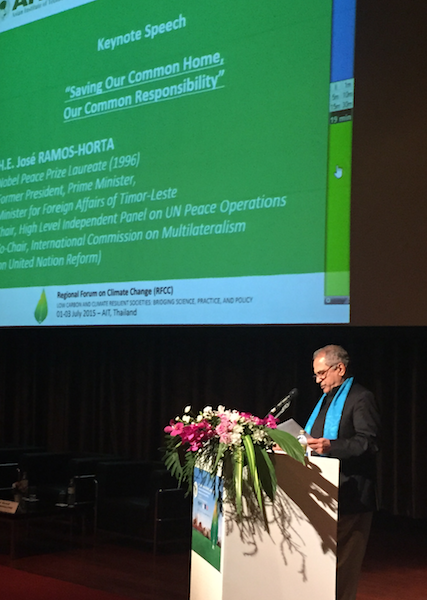BANGKOK, Thailand– With barely five months to go before a potentially historic United Nations summit on climate change takes place in Paris, governments are expected to put their political weight behind reaching an ambitious global climate deal. Increasingly, one key aspect in achieving the critical agreements is the leadership role of Asian countries, said former Timor-Leste President Jose Ramos-Horta.
“ Failure is not an option in Paris,” Horta told the delegates of the Regional Forum on Climate Change. “ It is up to politicians to show statesmanship on a global scale. Diplomats and politicians will be held responsible for any failure in Paris.”
The climate talks in Paris could be one of the most important climate change meetings since the failed 2009 UN climate talks in Copenhagen. More than 200 governments are expected to attend the two-weeks conference in an attempt to hammer out a legally binding agreement in reducing greenhouse gas emissions and to keep global warming below 2 degrees Celsius.
“ We are here to reinforce the collective engagement on such important matters for everyone in the region, to highlight our awareness and readiness to undertake this highly needed program of action, and to outline relevant ways for mitigation and adaptation,” Ramos-Horta told the more than 400 delegates composed of climate experts, policymakers and civil society groups from the Association of South East Asian Nations (ASEAN). “ We are here to send the green light that we are ready at regional level. We know that good solutions exist at all levels, from local, national to international.”
The forum was organized by the Asian Institute of Technology in Thailand and the French Ministry of Foreign Affairs and International Development, the ASEAN and the European Union.
ASEAN member countries are the Philippines, Brunei Darussalam, Cambodia, Indonesia, Laos, Malaysia, Myanmar, Singapore, Thailand and Vietnam.
Aware of the sticky issues surrounding the climate talks, Ramos-Horta, who is also a Nobel Peace Prize recipient, said world leaders must demonstrate their political will in coming up with a solution on: adaptation, mitigation, loss and damage, finance, national climate actions, forests issues, gender balance and gender sensitivity, education and awareness raising.
Mr Ramos-Horta said Asians needed to stop “ pointing fingers” on who should take greater responsibility and instead push for innovative and greater investment in renewable energy to improve the environment.
He said Asian countries must focus on building clean economies to boost growth, increase wealth and reduce pollution.
“ Human beings were and are responsible for climate change and human beings must find the solutions. Science has spoken, now it is up to us to lead,” Ramos-Horta said. “ Although we still face many challenges to get all conditions in order to reach the December 2015 goal, significant steps forward have taken place and there is reason to be optimistic about the climate talks in Paris.”
with reports from Shaira Panela and Anna Valmero
photo credit: Shaira Panela and Anna Valmero



